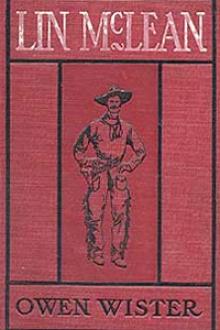The Virginian: A Horseman of the Plains, Owen Wister [best e books to read txt] 📗

- Author: Owen Wister
Book online «The Virginian: A Horseman of the Plains, Owen Wister [best e books to read txt] 📗». Author Owen Wister
He needed no interpreter for the voices of the seeming owls that had haunted the latter hour of their journey, and he knew that his beast's keener instinct had perceived the destruction that lurked in the interior of the wood. The history of the trapper whose horse had returned without him might have been—might still be—his own; and he thought of the rag that had fallen from the buzzard's talons when he had been disturbed at his meal in the marsh. “Peaceable” Indians were still in these mountains, and some few of them had for the past hour been skirting his journey unseen, and now waited for him in the wood which they expected him to enter. They had been too wary to use their rifles or show themselves, lest these travellers should be only part of a larger company following, who would hear the noise of a shot, and catch them in the act of murder. So, safe under the cover of the pines, they had planned to sling their silent noose, and drag the white man from his horse as he passed through the trees.
Balaam looked over the river at the ominous wood, and then he looked at Pedro, the horse that he had first maimed and now ruined, to whom he probably owed his life. He was lying on the ground, quietly looking over the green meadow, where dusk was gathering. Perhaps he was not suffering from his wound yet, as he rested on the ground; and into his animal intelligence there probably came no knowledge of this final stroke of his fate. At any rate, no sound of pain came from Pedro, whose friendly and gentle face remained turned toward the meadow. Once more Balaam fired his pistol, and this time the aim was true, and the horse rolled over, with a ball through his brain. It was the best reward that remained for him.
Then Balaam rejoined the old mare, and turned from the middle fork of Sunk Creek. He dashed across the wide field, and went over a ridge, and found his way along in the night till he came to the old trail—the road which they would never have left but for him and his obstinacy. He unsaddled the weary mare by Sunk Creek, where the canyon begins, letting her drag a rope and find pasture and water, while he, lighting no fire to betray him, crouched close under a tree till the light came. He thought of the Virginian in the wood. But what could either have done for the other had he stayed to look for him among the pines? If the cow-puncher came back to the corner, he would follow Balaam's tracks or not. They would meet, at any rate, where the creeks joined.
But they did not meet. And then to Balaam the prospect of going onward to the Sunk Creek Ranch became more than he could bear. To come without the horses, to meet Judge Henry, to meet the guests of the Judge's, looking as he did now after his punishment by the Virginian, to give the news about the Judge's favorite man—no, how could he tell such a story as this? Balaam went no farther than a certain cabin, where he slept, and wrote a letter to the Judge. This the owner of the cabin delivered. And so, having spread news which would at once cause a search for the Virginian, and having constructed such sentences to the Judge as would most smoothly explain how, being overtaken by illness, he had not wished to be a burden at Sunk Creek, Balaam turned homeward by himself. By the time he was once more at Butte Creek, his general appearance was a thing less to be noticed. And there was Shorty, waiting!
One way and another, the lost dog had been able to gather some ready money. He was cheerful because of this momentary purseful of prosperity.
“And so I come back, yu' see,” he said. “For I figured on getting Pedro back as soon as I could when I sold him to yu'.”
“You're behind the times, Shorty,” said Balaam.
Shorty looked blank. “You've sure not sold Pedro?” he exclaimed.
“Them Indians,” said Balaam, “got after me on the Bow Leg trail. Got after me and that Virginia man. But they didn't get me.”
Balaam wagged his bullet head to imply that this escape was due to his own superior intelligence. The Virginian had been stupid, and so the Indians had got him. “And they shot your horse,” Balaam finished. “Stop and get some dinner with the boys.”
Having eaten, Shorty rode away in mournful spirits. For he had made so sure of once more riding and talking with Pedro, his friend whom he had taught to shake hands.
XXVII. GRANDMOTHER STARK
Except for its chair and bed, the cabin was stripped almost bare. Amid its emptiness of dismantled shelves and walls and floor, only the tiny ancestress still hung in her place, last token of the home that had been. This miniature, tacked against the despoiled boards, and its descendant, the angry girl with her hand on an open box-lid, made a sort of couple in the loneliness: she on the wall sweet and serene, she by the box sweet and stormy. The picture was her final treasure waiting to be packed for the journey. In whatever room she had called her own since childhood, there it had also lived and looked at her, not quite familiar, not quite smiling, but in its prim colonial hues delicate as some pressed flower. Its pale oval, of color blue and rose and flaxen, in a battered, pretty gold frame, unconquerably pervaded any surroundings with a something like last year's lavender. Till yesterday a Crow Indian war-bonnet had hung next it, a sumptuous cascade of feathers; on the other side a bow with arrows had dangled; opposite had been the skin of a silver fox; over the door had spread the antlers of a black-tail deer; a bearskin stretched beneath it. Thus had the whole cosey log cabin been upholstered, lavish with trophies of the frontier; and yet it was in front of the miniature that the visitors used to stop.
Shining quietly now in the cabin's blackness this summer day, the heirloom was presiding until the end. And as Molly Wood's eyes fell upon her ancestress of Bennington, 1777, there flashed a spark of steel in them, alone here in the room that she was leaving forever. She was not going to teach school any more on Bear Creek, Wyoming; she was going home to Bennington, Vermont. When time came for school to open again, there should be a new schoolmarm.
This was the momentous result of that visit which the Virginian had paid her. He had told her that he was coming for his hour soon. From that hour she had decided to escape. She was running away from her own heart. She did not dare to trust herself face to face again with her potent, indomitable lover. She longed for him, and therefore she would never see him again. No great-aunt at Dunbarton, or anybody else that knew her and her family, should ever say that she had married below her station, had been an unworthy Stark! Accordingly, she had written to the Virginian, bidding him good-by, and wishing him everything in the world. As she happened to be aware that





Comments (0)